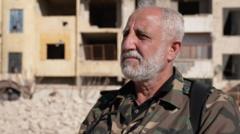For many Syrians, the end of Bashar al-Assad's regime symbolizes a chance for renewal, but the recent history with Russia complicates ambitions for an independent future. Ahmed Taha, a rebel commander from Douma, delineates the complex sentiment toward Russia — while seeing it as an enemy, he recognizes the need for the interim leadership to maintain strategic relations.
For nearly a decade, Russia and Syria collaborated closely, with Moscow securing military footholds in exchange for providing crucial support to Assad's forces against various rebel factions. This partnership, which intensified after Russia's military intervention in 2015, allowed the Kremlin to not only bolster the regime but also increase its influence in the Mediterranean region.
Now, with Assad's government weakened, a segment of the Syrian population expresses hope for a future devoid of Russian influence. The destruction wrought upon cities like Douma during the brutal conflict has left many like Taha feeling betrayed, a sentiment echoed by fellow rebels and civilians alike. "The Russians came to this country and helped the tyrants, oppressors, and invaders," lamented Abu Hisham, celebrating the regime's struggles.
Despite this discontent, the interim government, led by Ahmed al-Sharaa, appears open to negotiation, with remarks suggesting a continued partnership with Russia may not be off the table. Russian Foreign Minister Sergey Lavrov recently acknowledged these ongoing ties, emphasizing an intention to stay aligned with the new Syrian leadership.
However, the call for a Russian exit grows stronger across various Syrian demographics, including Christian communities who feel neglected by Moscow's promises of protection. Leaders within these groups emphasize the need to ensure Syria's sovereignty and healing without foreign intervention.
As discussions about the future of Russia's military bases occur, experts suggest that rebuilding the Syrian military entails either forging entirely new alliances or leaning on Russian support — a dichotomy that adds complexity to the situation.
In the shadow of past grievances, Syrian leaders confront the challenge of reconstructing their military capabilities while navigating a tumultuous geopolitical landscape, where the legacy of their foreign partnerships continues to loom large.



















